We need your consent to use the individual data so that you can see information about your interests, among other things. Click "OK" to give your consent.
ASTM F1832-07(2011)
Standard Test Method for Determining the Force-Draw and Let-Down Curves for Archery Bows
STANDARD published on 1.6.2011
The information about the standard:
Designation standards: ASTM F1832-07(2011)
Note: WITHDRAWN
Publication date standards: 1.6.2011
SKU: NS-51745
The number of pages: 3
Approximate weight : 9 g (0.02 lbs)
Country: American technical standard
Category: Technical standards ASTM
The category - similar standards:
Annotation of standard text ASTM F1832-07(2011) :
Keywords:
brace-height, compound bow, draw-stroke, force-draw, let-down, Archery equipment, Brace height, Compound bow, Draw-stroke, Force-draw curve, Let-down curve, Sports equipment, ICS Number Code 97.220.40 (Outdoor and water sports equipment)
Additional information
| Significance and Use |
|
This test method establishes the procedure to be used to measure the force necessary to draw an archery bow from brace height to the full draw position, and the holding force necessary to retain the bow string when the bow is let-down from full draw to brace height. The force values taken at increments of draw length are then plotted versus draw length using rectangular coordinates. The resulting curves are known as the force-draw curve and the let-down curve. The force-draw curve is used to determine the energy that the limbs of the bow store when it is drawn. The area under the curve between the positions of brace height and full draw can be expressed as stored energy. The let-down curve is used to determine the energy required to restrain the bowstring as the bow is let-down from full draw to brace height. The energy represented by the area under the curve can be subtracted from the stored energy in order to establish the static hysteresis of the bow system. |
| 1. Scope |
|
1.1 This test method covers the procedure to be used to determine the force-draw and let-down curves for archery bows. 1.2 The values stated in inch-pound units are to be regarded as the standard. The SI units given in parentheses are for information only. 1.3 This standard does not purport all of the safety concerns, if any, associated with its use. It is the responsibility of the user of this standard to establish appropriate safety and health practices, and determine the applicability of regulatory limitations prior to use. |
Similar standards:
Historical
1.5.2014
Historical
1.3.2011
Historical
1.5.2010
Historical
1.4.2011
Historical
1.5.2010
Historical
1.6.2013
We recommend:
Updating of laws
Do you want to be sure about the validity of used regulations?
We offer you a solution so that you could use valid and updated legislative regulations.
Would you like to get more information? Look at this page.



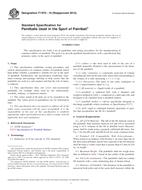 ASTM F1979-10(2014)..
ASTM F1979-10(2014)..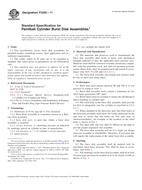 ASTM F2030-11
ASTM F2030-11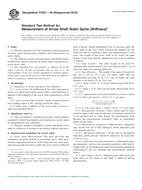 ASTM F2031-05(2010)..
ASTM F2031-05(2010).. ASTM F2040-11
ASTM F2040-11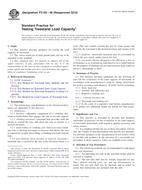 ASTM F2120-06(2010)..
ASTM F2120-06(2010).. ASTM F2121-13
ASTM F2121-13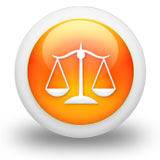
 Cookies
Cookies
